Having a friend like Amy Rosebush of What’s A Name, Really? is like having your own AI djinni. My wish is not her command but her delight. In this case, I asked for round-bodied women and gave some particular descriptions that she turned into prompts. As you’ll see, the results are stunning. But first, it came back with women-in-the-round:
who made you judge and jury over me?
One of these was perfect for perhaps my favorite music video, which fit my theme. The song is Laura Mvulu’s That’s Alright and the lyrics go “I will never be what you want and that’s alright. Because my skin ain’t light and my body ain’t tight. And that’s alright.” They continue, “Who made you the center of the universe? Who made you judge and jury over me?” Those questions are bigger than any personal relationship.
using the f-word
This started because my youngest daughter Cassandra was listening to a podcast called Maintenance Phase that she was finding revolutionary. It’s co-hosted by Michael Hobbes, author of HuffPost’s ‘You’re Wrong About’ & Aubrey Gordon. They are funny, have fun together, and are very well researched.
I’ve learned how the school-wide humiliation ritual that was the Presidential Fitness Test was related to the ability to throw grenades. I learned about Moon Juice, the wellness diet of adaptogens, brain dust and hot sex milk. I got Halo Ice Cream’s trick of packaging low-calorie air—and since my new craze is making semi-freddo, you can skip the synthetic sugars and freeze air yourself. And I finally got the deep dive on the Twinkie Defense. But mostly I’ve learned about the experience of being fat.
Aubrey is the author of “You Just Need to Lose Weight and 19 Other Myths About Fat People.” Its intent is ‘to debunk common anti-fat myths and to take action for fat justice.’ And yes, she’s not afraid to use the f- word. Aubrey first wrote anonymously as ‘Your Fat Friend’, and this is the trailer for the film by that name:
So I just want to pause and look at this meme on Select your SPIRIT CHONK and ask, “Why do we find round-body animals to be unbearably adorable and yet take the shape of other people to be a personal affront?”
the fat lady about town
Aubrey goes deep into the personal affront, the psychology of other people’s judgments, the street harassment. She tells hard-hitting anecdotes that will make you flinch. Even well-intentioned comments can be unconsciously insulting. In one essay, she says it’s time to retire ‘You’re not fat, you’re beautiful.’ She writes:
As if I couldn’t be both. As if impossibly beautiful fat women like Lizzo, Aidy Bryant, Queen Latifah, and Beth Ditto hadn’t long since shown us the power of fat beauty. You’re not fat, you’re beautiful. As if my size had any bearing on my beauty. As if their size had any bearing on theirs.
She continues:
I am fat. Undeniably, indisputably fat. I wear a U.S. women’s size 26. Throughout my adult life, my weight has fluctuated from between 300 and 400 pounds. The body mass index tool (which is a notoriously flawed measure of health) categorizes my body as “extremely obese” or “super morbidly obese.” By any measure, I am fat. Still, when I simply, neutrally acknowledge my size, those around me rush to interject, breathlessly insisting, You’re not fat, you’re beautiful.
Perhaps it’s like saying, ‘You’re not black, you’re beautiful.’ Or ‘You’re not disabled, you’re beautiful.’ I don’t know if Aubrey would refer to her weight as a disability, yet it seems like the one with the most shaming done to it. Aubrey states that people think, ‘Why doesn’t she put in a little effort?’ Rather than, ‘I bet that person is putting in a lot of effort.’ And that reaction has more to do with the viewer than the fat lady about town, as Aubrey also calls herself.
Let’s pause again for some round bodies in repose, from abracadabra Amy:
the humiliation hurdles
My ex’s brother was also ‘super morbidly obese.’ To say he had a chip on his shoulder would be an understatement—he had a club on his shoulder. He didn’t want your pity and if you were going to hate him anyway, he’d give you reason to. I respected that.
Aubrey talks about 5 ways to Show Up for Your Fat Friends, which includes thinking about chairs that will hold them and tables bolted too close to booths to let them in. It is considering that airplane and auditorium seats won’t fit, they will end up with bruises, and those in the next seat will blame them for existing. It’s the constant threat of humiliation, from toilet seats to doctors to waiters to passersby, who will think their humiliation is deserved. I saw all of this second-hand.
As my husband often remarked, my brother-in-law didn’t eat twice as much as others, it was the luck of the genetic draw. In his 60’s, he developed thyroid cancer. In the process of treating it, they discovered that his thyroid was the size of a child’s—it had never developed. So all that time, there was nothing he could have done to change it. It wasn’t a moral failing or lack of self-discipline. It was luck.
To honor his relentless honesty about who he was, I offer this. He was never one to hide. What you see is what you get. Take a moment to appreciate without judgment.
the island of misfit toys
To my chagrin, my oldest daughter had to teach me to see her beauty when she rounded out. What kept me from seeing it was fear—fear of the cruelty of middle school girls, the rejection of high school boys, the projection of her irascible uncle onto her. Fear that I had made mistakes as a mom.
I wish I could go back, from this vantage point, and assure her it was going to be okay. She was beautiful then and gets more beautiful each time I see her. Fortunately, Veronica had the confidence in herself that I should have had in her.
I wasn’t wrong about middle school girls. Seventh grade is a hell that should just be skipped, like the 13th floor on elevators. Veronica went from being pathologically popular in grade school to coming home crying more days than I could count. I read the book Queen Bees & Wannabes as if my life depended on it.
Her friends were in the Wannabe group, intent on climbing the Queen Bee hierarchy. They spent lunchtime posing, with foods that could be eaten gracefully or not at all. They made plans without her. The most vicious one was closest in weight but even then Veronica knew her mom was dying of cancer and didn’t blame her.
Then Veronica brought in another friend and was no longer the biggest. One day when the friend wasn’t in the room, someone made a mean remark and Veronica joined in. From the other side of the door, the friend heard and ran off crying. Veronica thought, “Why have I hurt this person, who really cares about me, for these bitches?” It was the last time she ever did.
She broke from that group and formed what I later called the Island of Misfit Toys. She took in all the strays: the weird band kids, the ones who tried too hard, the ones with messed up families and hidden lives. These are the same ones who just came from around the country for her 32nd birthday, the sisterhood of the unravelling past.
As these young women mature into their own bodies, after kids, chronic conditions, trauma or just life, they’ve turned to Veronica for advice. It’s not lost on her that she’s what they feared. Lucky for them, she’s also proof positive it’s going to be better than fine—the future is going to be brilliant. Happy endings aren’t one size fits all.
How much trepidation might be spared if our fairy tales pictured women who have come into their own, without needing to be saved, without ruling over anyone. The story isn’t over when the round lady sings, it’s just begun. Here are some images from Amy, each of which begs a magical tale for a heroine who isn’t 16 yrs old and 116 lbs:
food weirdness
I have a friend who does counseling for eating disorders. She says that we’re all on the food weirdness spectrum—no one has an unself-conscious, natural relationship to food anymore. I know that for me, I don’t control my weight, my weight controls me.
It controls whether I feel that things are deteriorating, in my own life and in the world, or whether they’re getting better. There’s a mystique to losing weight that has no predictable correlation to what I eat. Yesterday I ate mostly waffles and lost a pound. When it’s working, I feel like I’ve found the Holy Grail and am insufferably smug and virtuous. When it’s not, I know that only a twist of genetic fate—and not willpower—separates me from anyone else. My wellbeing hangs by a whim of the universe.
This is far too much power for food to have. We talk about eating in moral terms, being ‘good’ or ‘bad.’ Now there’s the whole ‘clean eating’ terminology. Does that make the rest ‘dirty?’ Someone who is thin is considered an authority on everything. Clearly, they’re doing something right and so must be an expert on foreign policy. Someone who is a normal size or—gasp! fat!—can’t be trusted. Especially if they’re a woman.
I am just wanting to name this and not pretend it’s not a thing. Oops, gotta go to my aerial open climb and 7-minute Cirque de Soleil ab workout. But first I have time for one more waffle!
dystopias & dysmorphia
Aubrey and Mike talk about how the food industry exploits the desperation to lose weight with things like Snackwells and the anti-fat craze. They cite the food pyramid recommending 11 slices of bread a day. They see this as a marketing ploy showing all fads are the same, whether gluten-free, paleo, keto or Atkins.
I kept waiting to hear the phrase ‘shelf-stable’ and how fats are perishable and go rancid, unlike carbs. There’s a reason the food industry picked on fats and not sugars. A Kansas study from the Organic Consumers Association showed that 68% of food sold in the US is ‘hyperpalatable’ and tobacco-owned brands are even more so. Hyperpalatable means addictive with quick hits of chemical brain triggers that induce ‘sustained eating’:
“The majority of what’s out there in our food supply falls under the hyperpalatable category,” Fazzino said. “It’s actually a bit difficult to track down food that’s not hyperpalatable. In our day-to-day lives, the foods we’re surrounded by and can easily grab are mostly the hyperpalatable ones. And foods that are not hyperpalatable, such as fresh fruits and vegetables—they’re not just hard to find, they’re also more expensive. We don’t really have many choices when it comes to picking between foods that are fresh and enjoyable to eat (e.g., a crisp apple) and foods that you just can’t stop eating.” …
“These foods have combinations of ingredients that create effects you don’t get when you eat those ingredients separately,” the KU researcher said. “And guess what? These combinations don’t really exist in nature, so our bodies aren’t ready to handle them. They can excessively trigger our brain’s reward system and disrupt our fullness signals, which is why they’re difficult to resist.” …
“It’s not just about personal choice and watching what you eat—they can kind of trick your body into eating more than you actually want.”
These foods are drugs. On other drugs, Aubrey gives her own experience of being put on Fen-Phen at 14 and the corruption of pharmaceutical companies who knew the harms before releasing it. Yet she doesn’t extrapolate this to other pharmaceutical products when she encourages those who are fat to get the vaccine early without guilt, and says those juicing wheatgrass are ‘almost like anti-vaxxers but not quite.’
Aubrey cites the begrudging medical care from doctors, some of whom put a weight limit on patients they’ll see. I know this bias is true. I have a friend who was a pro-vaxx nurse during the ‘pandemic’, who casually mentioned the shorthand tftb—too fat to breathe. Were the early vaccines part of the eugenics plan, like they were for the elderly? Was there more to the sudden inability to breathe than the so-called virus?
There is also a significant gap in earnings dependent on weight. Aubrey’s solution to both of these is government regulation, despite her recognition that the FDA has been complicit in causing the problems. She and I diverge here. She believes the job of government is to force rich people to take care of the poor. I believe its job is to enable families and communities to take care of themselves.
But Aubrey has experience and insights that I don’t have. She tells me Southwest has a ‘person of size’ policy that they can buy two seats and get refunded for one after the flight. A brilliant solution and another reason I love Southwest! It’s not a mandate but a consumer choice I’m happy to support. People are good and want others to be happy; regulations where everyone is already being squeezed just lead to resentment.
This is the healthcare industry I hope to see:
dance is for every body
One of the many things I love about my dance teacher, Gina, is that it’s not condescension when she says dance is for every body. What Gina does is HIIT: high intensity interminable training. It includes face yoga, aka laughing. Her classes go for as long as we can stand it, but she would go forever. There are some of the fittest women in Santa Cruz. And there are round bodies and pear bodies and gangly bodies and compact bodies. And those who’ve trained as teachers are all body types.
What I realized in studying Worldanz is that ballet and its European offshoots may be the only style designed for skinny women. Certainly all the African styles are not—we do Senegalese, Congolese, Afro-Beats from South Africa. Not Jamaican dancehall or Haitian voodoo. Not Hawaiian or Tahitian. Middle Eastern bellydance requires a belly, preferably with hips. Ukrainian and Russian—we are nonpartisan—require power and strength more than grace. Brazilian capoeira is nimble, so sleight of foot is an advantage but samba and salsa are for ample women.
I took an Afro-Beats class from a black woman in Oakland who’d been a ballerina but quit from the stress. When she started Afro-Beats, she went through imposter syndrome because she didn’t have the right body type. That sounds like a humble brag from a woman who could be a model but it was so real she now coaches others as Alicia Dance Dragon Slayer.
A round body teacher is one of the choreographers of a new Voguing version of Cats. Competing with drag queens on a long, slim waist is a losing proposition so, as a woman, better to go the other way.
One round body student told Gina she’d once overheard her dad say to her mom, “We need to plan to take care of her because she’ll never get married.” She became a teacher and choreographer who specializes in twerking—not my forte but I blame equipment failure. Her type is black basketball players.
What I’ve noticed from my observation of daughters and friends is that men are not as ‘narrow-minded’ as it would seem by the most vocal among them. And it’s not a matter of ‘settling.’ A round-bodied friend who specialized in bellydance is now engaged to a guy she met at the gym. Her fiancé is who Gina drafts for performances where we need a male prop in a gold lamé speedo and sequined Uggs, usually for songs like “It’s Raining Men.”
Amy has outdone herself in giving me glorious women dancing with abandon or intent. In the tradition of fireworks, here is a grand finale of fabulous images:
growing your eyes
This will seem like a segue but it comes back around. The most difficult thing I ever tried to wrap my brain around was jazz improvisation. Along with calculating things like the augmented 11th of a scale was hearing the beauty of discordant notes. How could I recognize what sounded right when it all sounded wrong? My piano teacher told me I needed to ‘grow my ears.’ And sure enough, once I learned to love the clash and cacophony, harmony was boring.
Even in the process of thinking about this episode, I’ve been looking around for examples. And they are all around me, a round all: buoyant women at the farmer’s market, strong sturdy women climbing the rope and doing trapeze like no body’s business. And that’s the key here—it’s no body’s business what any other body looks like, how they eat, how they live.
We think that fear keeps us safe and self-criticism keeps us thin, but it’s not true. Grow your eyes to take in the range of human beauty. Set aside your projection of your own fears and appreciate. The judgment you let go won’t come back to haunt you. Be the mirror in your eyes that you’d want to see reflected back. The peace and happiness you save may be your own.
I take a close look at a July 2020 study on 'persuasive messaging' for a vaccine not yet released. The Naked Emperor fulfilled my wish for details on what triggers compliance and scorn for those who don't. I examine some of the repercussions citing a tender and emotional comment thread. I question if persuasive messaging on Ukraine has been similarly tested, quoting Matt Taibbi's article, Give War a Chance. I end with the advice to be kind to ourselves and generous to other people, even when we're the target of their contempt. Let go of accomplishment, we're on a bullet train and we're all getting somewhere without doing anything.
As world events spin out of control, I suggest we slow down. The faster we run, the further the goal moves away. I tell a story about nick-of-time miracles and permaculture spirituality. I look at empire vs. sovereignty and means vs. ends. I compare time to a hamster wheel. As things spin into control, I suggest we bide our time while spirit does the heavy lifting.

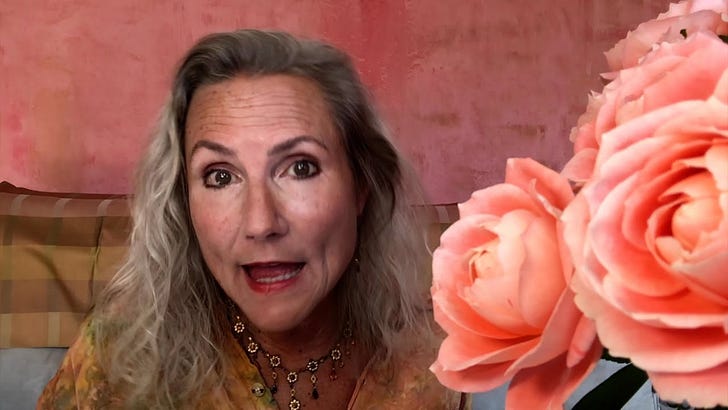












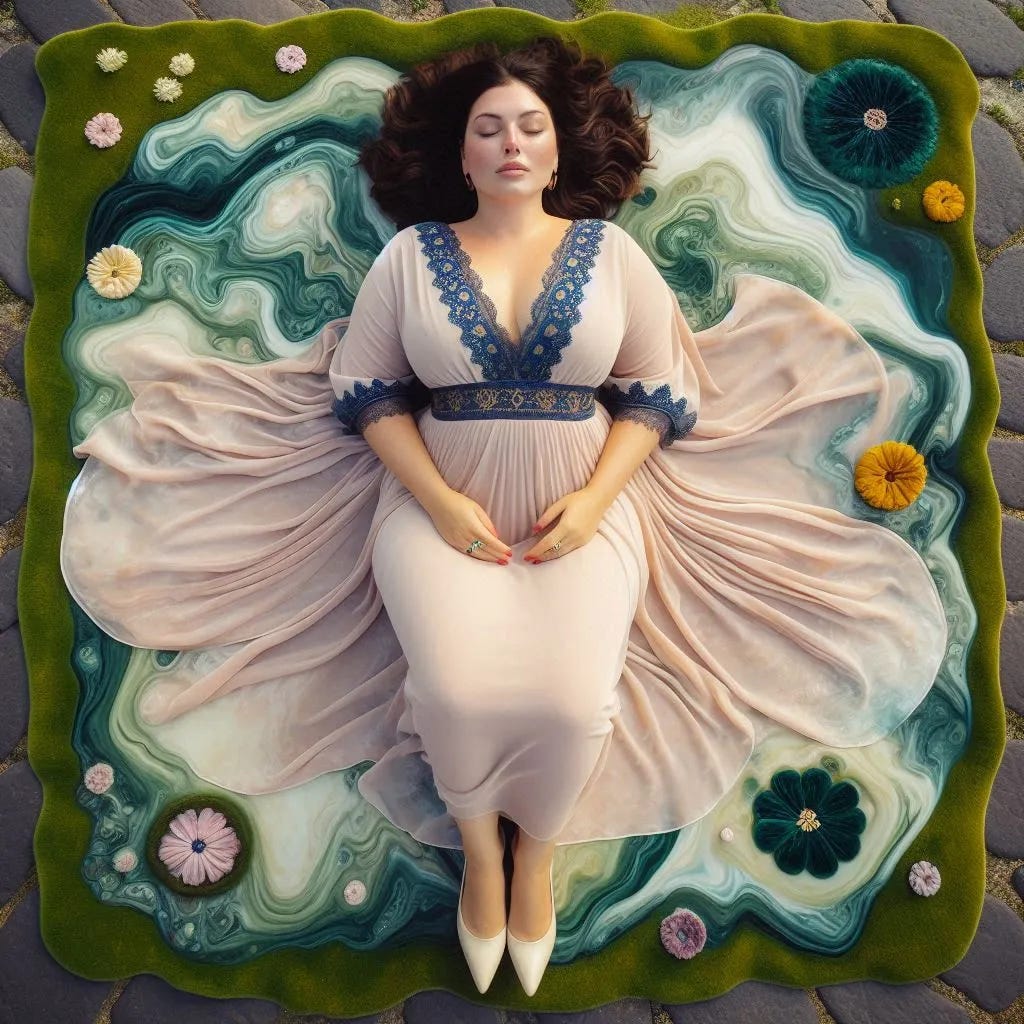






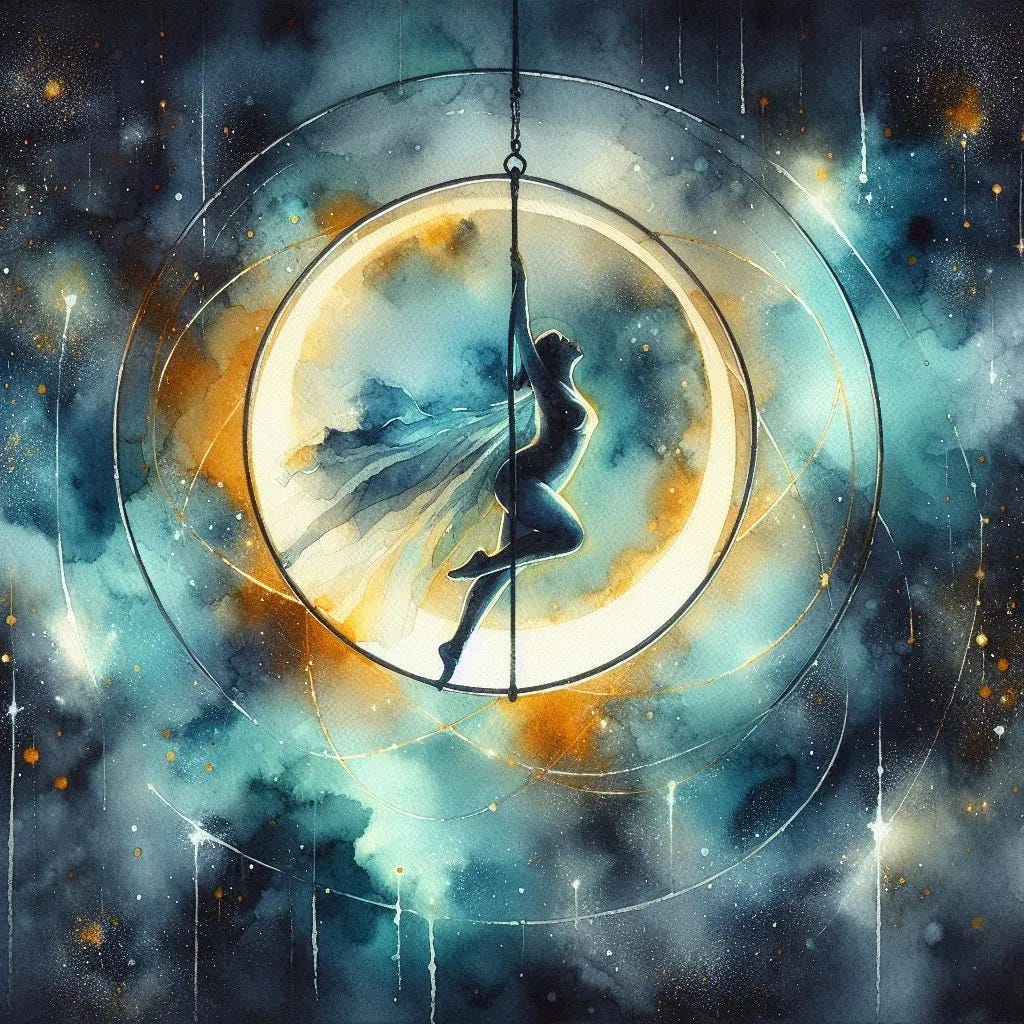


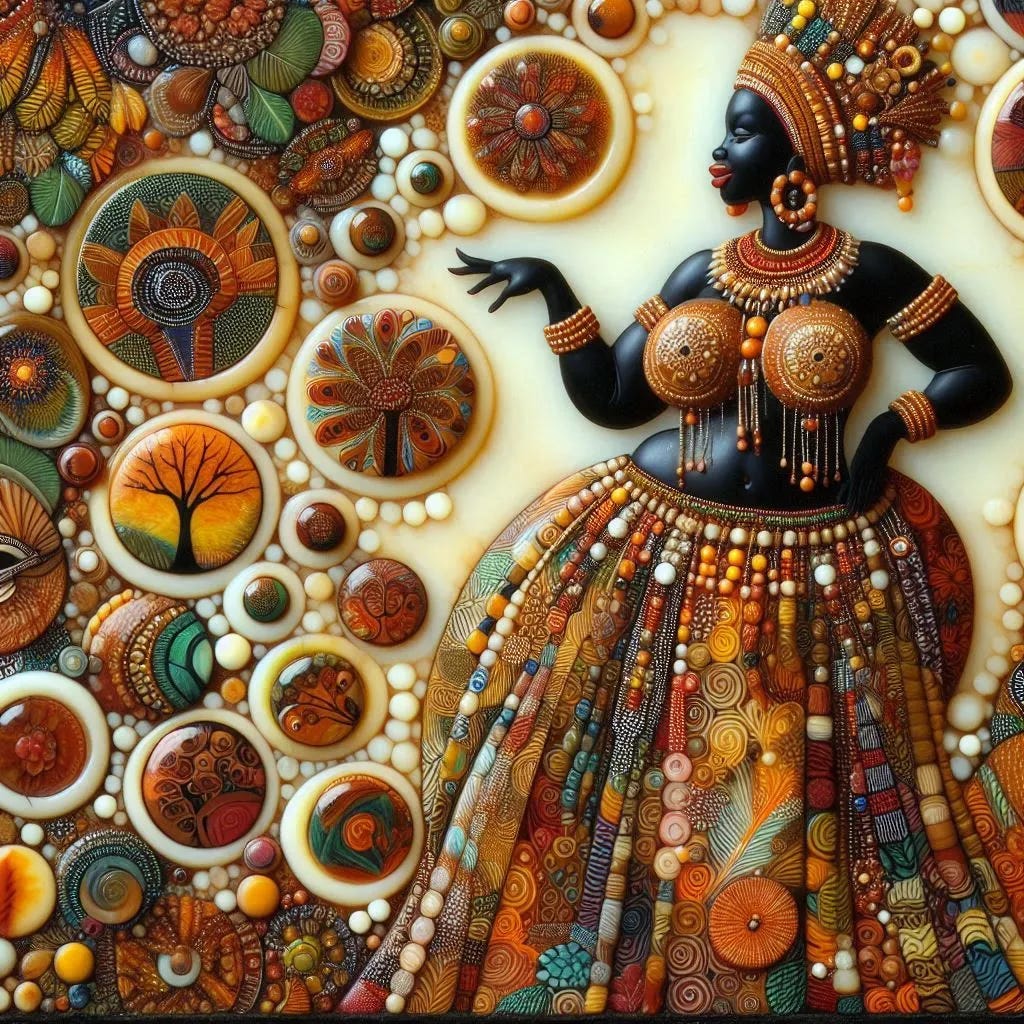





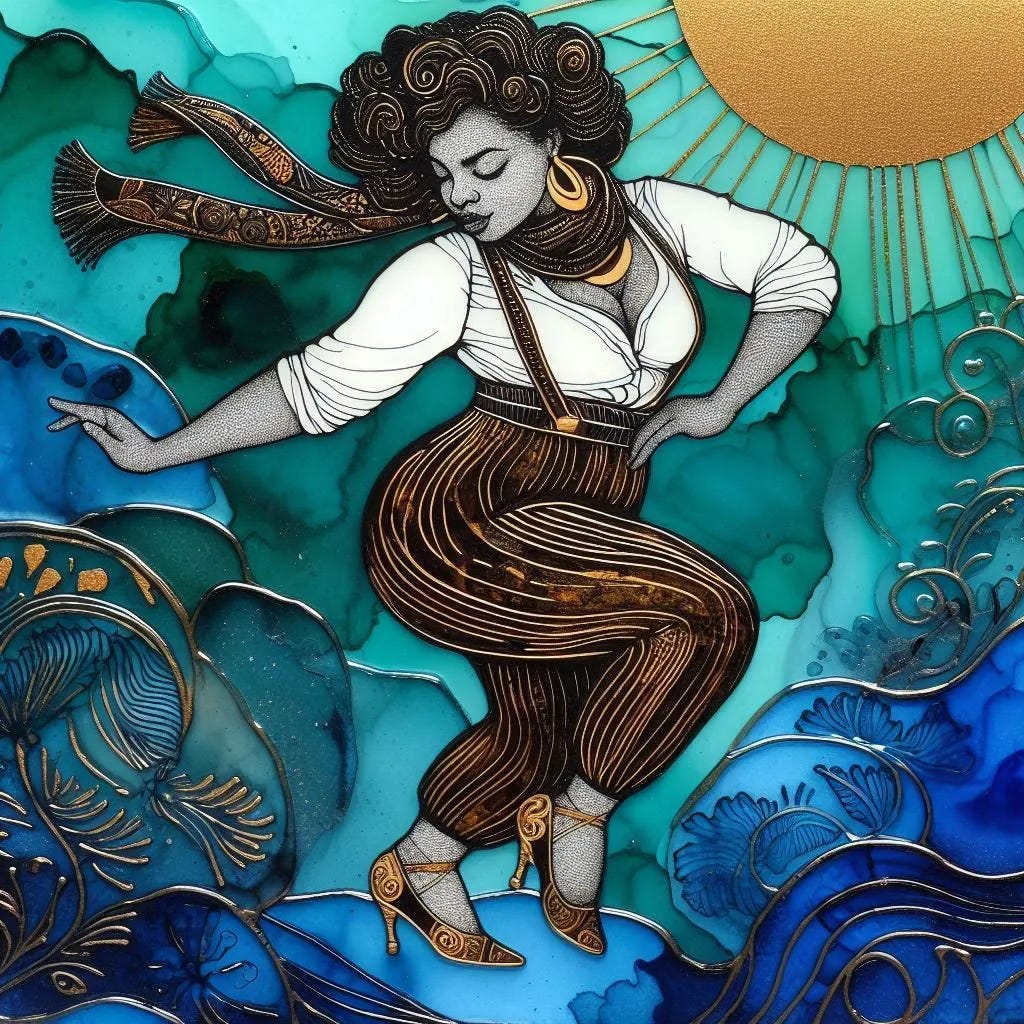






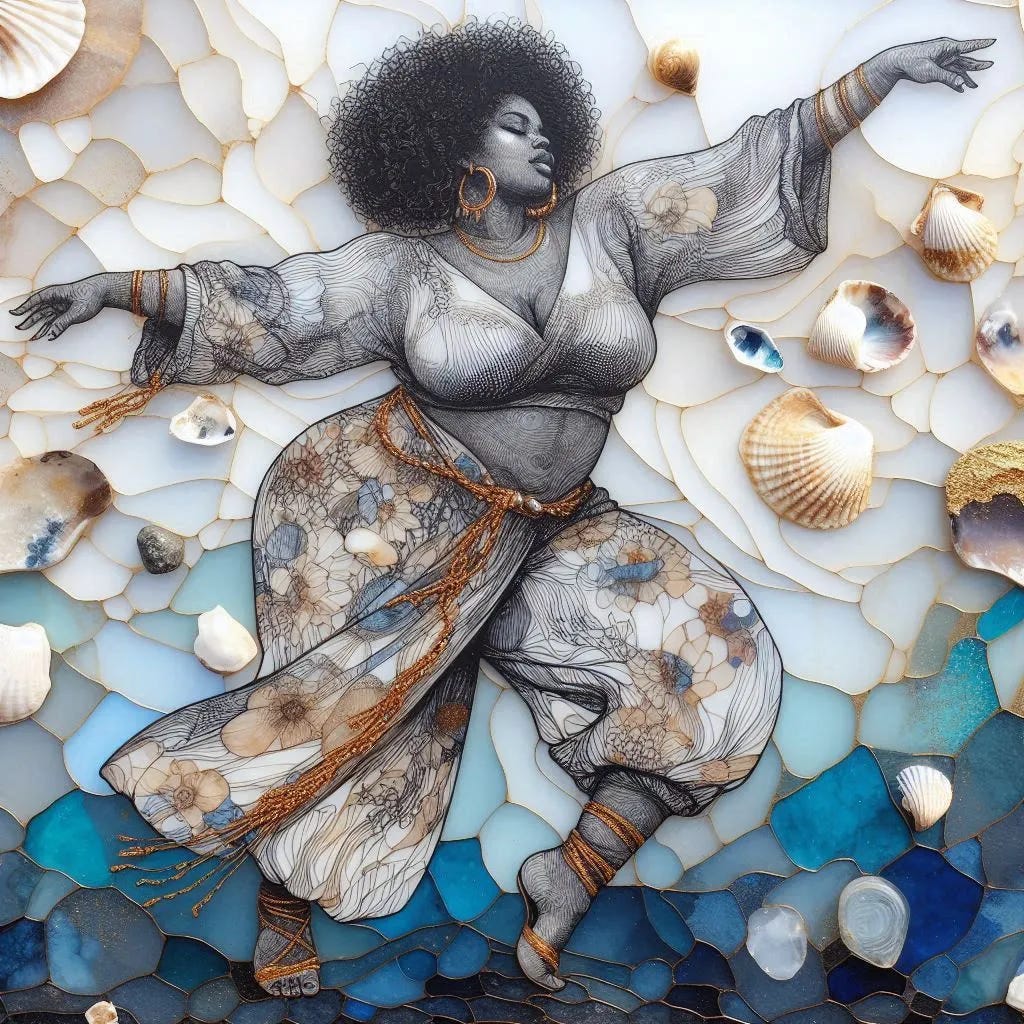


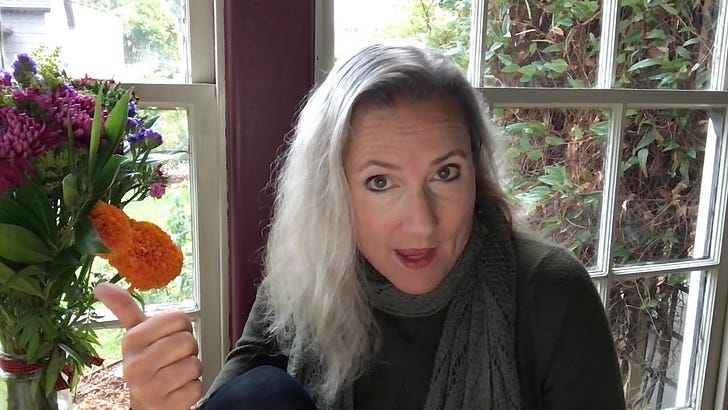
Oh my, these images are gorgeous! There’s something purely earthly about big bodies. Maybe it’s my culture too where often the elder wise women took on a bodacious presence. But I think of Gaia as chunky and big bosomed, enough to feed all her children. But sexy at the same time too. Folks put too much effort in shaming other peoples’ bodies. Sheesh! Much rather connect on a spiritual and mental level. Who cares what your meat suit looks like!
Love this one, Tereza.